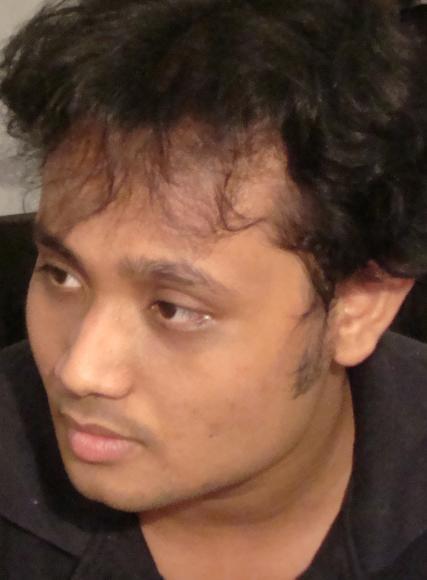Aruni Kashyap, young English language poet from Assam, opened up for discussion several problems and issues relevant to contemporary Assam in a Poetry Reading Program held at Hansraj College, University of Delhi, on 26th August, 2008. This was the monthly reading series that the Department of English, Delhi University organizes. He read his poems along with eminent Hindi poet Jitendra Srivastava.
Jitendra Srivastav teaches Hindi at Indira Gandhi National Open University and Aruni Kashyap is a student of MA English Literature at St. Stephen's College, University of Delhi. Jitendra Srivastav has published three poetry collections and they are In Dino Halchal (2000), Anbeli Katha (2003), and Asundar Sundar (2008). He has also written critical works on Hindi literature and they are Bharatiya Samaj Ki Samasyae Aur Premchand (2002), Bharatiya Rastrabaad Aur Premchand (2004), and Sabda Mein Samay (2008). He is also the winner of "Kirti Sanman (2005)" and "Ramchandra Shukla Puraskar (2006)."
Aruni Kashyap has published in Amar Asom, Sadin, Satsori, The Assam Tribune, Tehelka, Postcolonial Text , The Daily Star, Indian Literature, Muse India and Pratilipi. Aruni debuted in Assamese with his popular column "Dilli Vishawavidyalar Pora" in Amar Asom daily, when he was a young student of BA English at St. Stephen's College Since then, he has written reviews, essays, short stories in Assamese and English. Homen Borgohain wrote in "Prothom Kolom", Amar Asom that, "Aruni Kashyap's name is one of those names that would be uttered among the best writers and scholars in Assam after ten years."
"I didn't choose English, but English chose me", he said in the interactive session that followed after his reading, when asked by the audience how he inhabits two languages. "Since childhood, I have been writing in Assamese and after coming to Delhi I started writing poems in English. I read Ngugi Wa Thiongo in college, and used to feel guilty, thinking if I had cheated my people, state and culture by choosing to write in a colonial language."
"But gradually I understood the necessity and responsibility of writing in a language which is not my own. Being from a post-colonial nation, we cannot avoid the presence and importance of English. We need more English writers from Assam so that issues and problems get discussed at least in the national level, if not international. Today, I don't have to wait till my work is translated and hence I can make my work available to the whole world and open up what we are suffering at the hands of the central government, the Indian army and the corrupt politicians of Assam and also what we face here in Delhi, Bombay and Bangalore as students." Almost all of Aruni's poems are about Assamese rural life, history, and borrows extensively from folklore.In the section "Blood, Guns and the Sun" he read out poems that depicted the plight of common people caught amidst insurgency due to ULFA and racist attitudes faced by Northeastern people in Delhi.
He was also asked about the theme of exile, and he said that it "Has a historical lineage. Had I not come to Delhi to study, may be I wouldn't have written in such a nostalgic manner about Assam. In this way, I feel myself linked to the Assamese students in Calcutta in the late 19th century and early 20th century. Dr Moheswar Neog in his history of Assamese literature says that it was the nostalgic feeling among Assamese students that lead to "swajon preeti" and thus they formed the Asomiya Bhasar Unnati Sadhini Sobha in 1884."
Aruni plans to publish a collection of poems in English soon. "I want to continue writing in English and Assamese. It's more liberating to write in my mother tongue, but since English came too, I'd continue as it opens up Assam for the rest of world more easily."
Jitendra Srivastav teaches Hindi at Indira Gandhi National Open University and Aruni Kashyap is a student of MA English Literature at St. Stephen's College, University of Delhi. Jitendra Srivastav has published three poetry collections and they are In Dino Halchal (2000), Anbeli Katha (2003), and Asundar Sundar (2008). He has also written critical works on Hindi literature and they are Bharatiya Samaj Ki Samasyae Aur Premchand (2002), Bharatiya Rastrabaad Aur Premchand (2004), and Sabda Mein Samay (2008). He is also the winner of "Kirti Sanman (2005)" and "Ramchandra Shukla Puraskar (2006)."
Aruni Kashyap has published in Amar Asom, Sadin, Satsori, The Assam Tribune, Tehelka, Postcolonial Text , The Daily Star, Indian Literature, Muse India and Pratilipi. Aruni debuted in Assamese with his popular column "Dilli Vishawavidyalar Pora" in Amar Asom daily, when he was a young student of BA English at St. Stephen's College Since then, he has written reviews, essays, short stories in Assamese and English. Homen Borgohain wrote in "Prothom Kolom", Amar Asom that, "Aruni Kashyap's name is one of those names that would be uttered among the best writers and scholars in Assam after ten years."
"I didn't choose English, but English chose me", he said in the interactive session that followed after his reading, when asked by the audience how he inhabits two languages. "Since childhood, I have been writing in Assamese and after coming to Delhi I started writing poems in English. I read Ngugi Wa Thiongo in college, and used to feel guilty, thinking if I had cheated my people, state and culture by choosing to write in a colonial language."
"But gradually I understood the necessity and responsibility of writing in a language which is not my own. Being from a post-colonial nation, we cannot avoid the presence and importance of English. We need more English writers from Assam so that issues and problems get discussed at least in the national level, if not international. Today, I don't have to wait till my work is translated and hence I can make my work available to the whole world and open up what we are suffering at the hands of the central government, the Indian army and the corrupt politicians of Assam and also what we face here in Delhi, Bombay and Bangalore as students." Almost all of Aruni's poems are about Assamese rural life, history, and borrows extensively from folklore.In the section "Blood, Guns and the Sun" he read out poems that depicted the plight of common people caught amidst insurgency due to ULFA and racist attitudes faced by Northeastern people in Delhi.
He was also asked about the theme of exile, and he said that it "Has a historical lineage. Had I not come to Delhi to study, may be I wouldn't have written in such a nostalgic manner about Assam. In this way, I feel myself linked to the Assamese students in Calcutta in the late 19th century and early 20th century. Dr Moheswar Neog in his history of Assamese literature says that it was the nostalgic feeling among Assamese students that lead to "swajon preeti" and thus they formed the Asomiya Bhasar Unnati Sadhini Sobha in 1884."
Aruni plans to publish a collection of poems in English soon. "I want to continue writing in English and Assamese. It's more liberating to write in my mother tongue, but since English came too, I'd continue as it opens up Assam for the rest of world more easily."






Comments
Pages
Add new comment